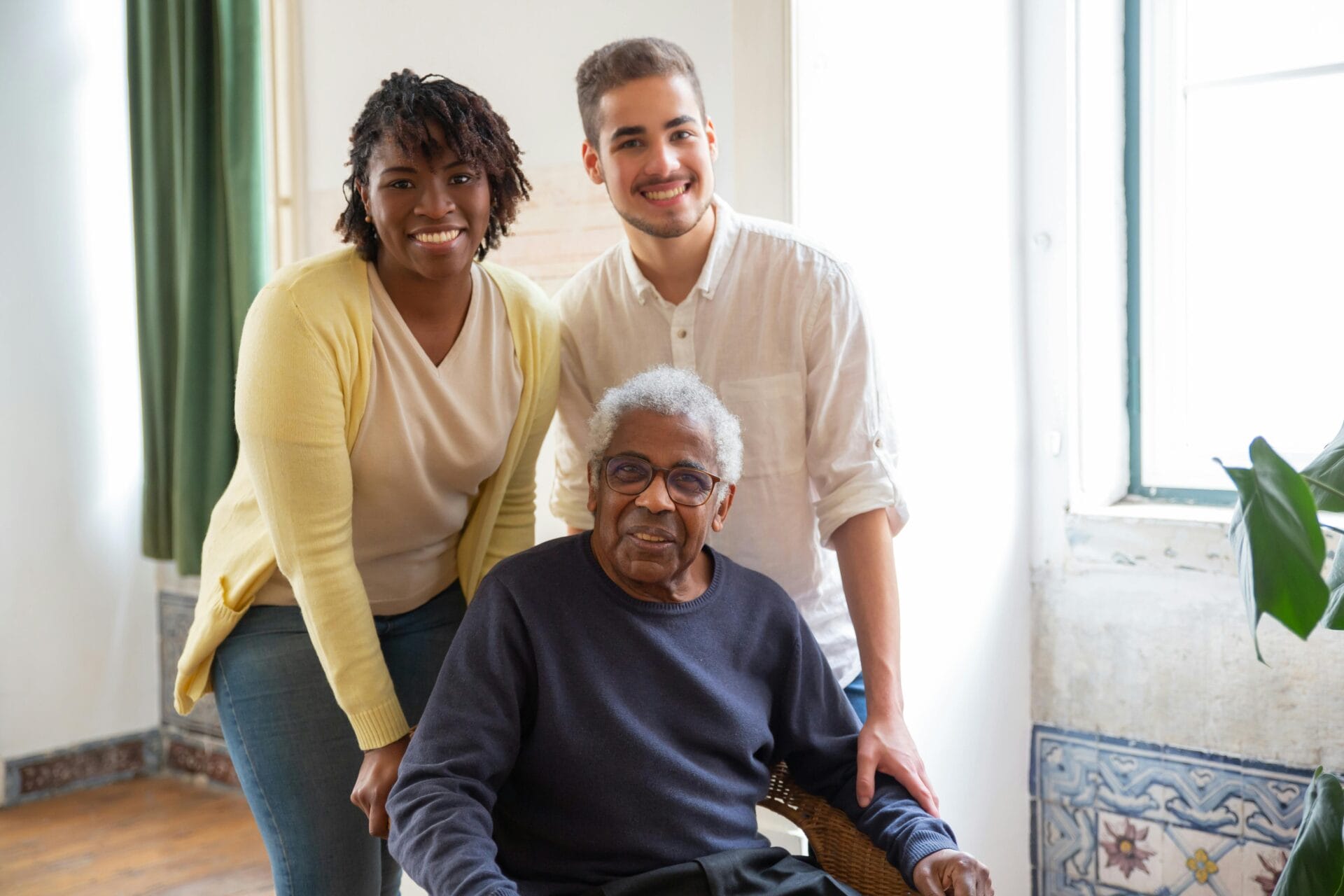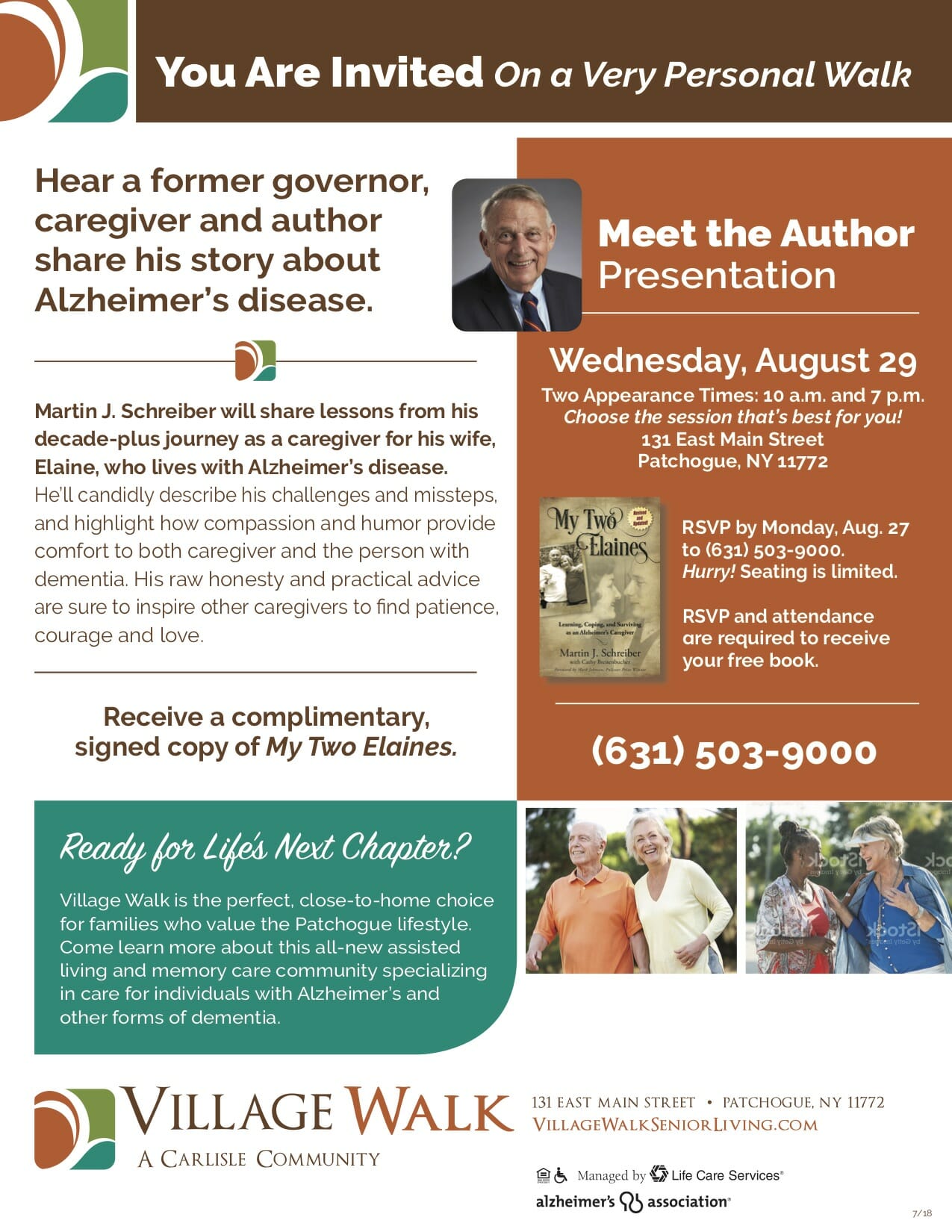Watching a loved one live with Lewy body dementia (LBD) can be heart-wrenching. This neurological disorder affects a person’s thinking, behavior, and movement.
Watching a loved one change over time can be tough. But you don’t have to go at it alone.
We’re here for you. And we’re here to empower you to make better decisions for you and your loved one.
At Village Walk, our trained memory care professionals provide memory care and assisted living comfort-and-care solutions to seniors with Lewy body dementia and other neurological conditions.
Looking for essential information about the seven stages of Lewy body dementia? Look no further. In this article, we’ll describe must-know information about LBD, as well as the seven stages of LBD.
We’re here to help you and your loved one age — and live with grace — for whatever life may throw our way. Let’s dive in.
The causes of Lewy body dementia
Before learning about the seven stages of Lewy body dementia (LBD), we want to familiarize ourselves with what LBD is and looks like.
LBD is caused by abnormal deposits of proteins in the brain. While the cause of this build-up of deposits is still unknown, what we do know is that these deposits deplete important feel-good chemicals in the brain like dopamine and acetylcholine.
Dopamine and acetylcholine are responsible for muscle movement, memory, thinking, and processing. With these chemical centers affected in the brain, the symptoms of Lewy-body dementia begin to manifest themselves.
Symptoms associated with Lewy body dementia
Lewy body dementia (LBD) can affect the following parts of the mind and body and result in the following symptoms:
- Thinking skills: trouble with numbers and language, making decisions, paying attention, multi-tasking, planning, organizing, remembering, and concentrating
- Motor symptoms and skills: shuffling or walking at a slower pace, balance issues, frequent falls, stiff muscles, tremors and shaking limbs, stooped posture, smaller handwriting, trouble swallowing and speaking, and loss of coordination
- Sleep: acting out dreams during sleep, sleeping a great deal during the day, trouble falling and staying asleep, and the urge to move legs while at rest.
- Mood: depression, anxiety, delusions, irritability, restlessness, paranoia, repetitive gestures (e.g. pacing, hand-wringing, and repeating certain words), and lack of interest in previously cherished activities and subjects
- Nervous system: LBD can affect the nervous system, resulting in unusual symptoms throughout the heart, glands, and muscles
At each of the seven stages of Lewy body dementia, these symptoms may be present. Let’s take a look at what each of the seven stages of LBD look like.
The 7 stages of Lewy body dementia explained
Having covered the symptoms of Lewy body dementia, the seven stages of Lewy body disease are:
- Stage 1: no cognitive decline
- Stage 2: very mild cognitive decline
- Stage 3: mild cognitive decline
- Stage 4: moderate cognitive decline (diagnosis)
- Stage 5: moderate to severe cognitive decline
- Stage 6: severe cognitive decline
- Stage 7: very severe cognitive decline.
We’d like to note that the progression of Lewy body dementia is different for each person. Some people may experience symptoms at varying degrees.
In the next sections, we’ll take a look at what you can expect in each of the early and later stages of Lewy body dementia.
Table: The 7 stages of Lewy body dementia
| Stage | Description |
| Stage 1: no cognitive decline | 1. Slight changes in behavior and mood 2. Increase in anxiety, depression, sleeplessness, and restlessness 3. Slight tremors, muscle stiffness, and slow movements |
| Stage 2: very mild cognitive decline | 1. Declines in cognitive functioning begin 2. Recall, language processing, and problem-solving are affected |
| Stage 3: mild cognitive decline | 1. Continued changes from stage two 2. May need assistance with more complex daily activities |
| Stage 4: moderate cognitive decline (diagnosis) | 1. Usually, when the diagnosis of Lewy body dementia occurs 2. Problems with dressing, bathing, eating, remembering, problem-solving, and communicating with others 3. Agitation, confusion, and frustration may increase |
| Stage 5: moderate to severe cognitive decline | 1. Significant cognitive decline may begin 2. People may have difficulty recognizing family and friends 3. People may rely on caregivers to a greater extent |
| Stage 6: severe cognitive decline | 1. A person with LBD can no longer communicate or respond to family and friends 2. A person with LBD may rely on a caregiver 100% of the time |
| Stage 7: very severe cognitive decline | 1. Complete memory loss, difficulties speaking, and challenges completing basic daily activities 2. May need help sitting up or walking 3. Decrease in mobility Increase in confusion |
Stage one: no cognitive decline
In stage one, signs of Lewy body dementia may not be noticeable. People with stage-one LBD may have slight changes in behaviors.
People with LBD in stage one may have increased anxiety, depression, sleeplessness, and restlessness. Individuals may also demonstrate difficulties in making decisions and remembering certain events.
Finally, when it comes to movement, people with LBD in stage one may display slight tremors, muscle stiffness, and slow movements.
Early symptoms of LBD look like those of Alzheimer’s and Parkinson’s disease. So, it’s crucial to seek medical advice if you notice any of the above symptoms. They may reveal a diagnosis of LBD.
But, by being proactive and checking in with your trusted healthcare professional, you can help slow the progression of the disease and help improve the quality of life of you and your loved ones.
Stage two: very mild cognitive impairment (MCI) or decline
In stage two, symptoms may become more pronounced.
Often called mild cognitive impairment (MCI) for short, stage two symptoms result in declines in cognitive functioning. Recall, language processing, and problem-solving are some of the first skills affected in stage two.
Tasks requiring concentration and multi-tasking also can become a challenge. For example, completing crossword puzzles, remembering a list of items, and conducting activities of daily living may be affected in stage two of LBD.
With that said, many people diagnosed with Lewy body dementia can maintain their independence and not need help with activities of daily living. For those exhibiting early signs of Lewy body dementia, ruling out a diagnosis of Alzheimer’s disease or Parkinson’s disease with dementia is key.
Stage three: mild cognitive decline
In stage three of LBD, symptoms become more pronounced. At stage three, people who live with LBD may have increased anxiety, depression, and apathy about life. They may need help with more complex daily activities (such as managing their finances and taking medications).
It’s at this stage that people with LBD may become frustrated or overcome with emotion. At this point, it’s best to continue to stay calm — both for you and your loved one with LBD.
With the right support, care, and understanding, a person with LBD can continue to live a rich life of exciting hobbies and meaningful interactions with loved ones.
Stage four: moderate cognitive decline (diagnosis)
It’s usually at stage four where a person may experience a decline in cognitive abilities. For example, many people have issues with dressing, bathing, eating, remembering, problem-solving, and communicating with others.
Many people receive the diagnosis of LBD in stage four because it’s become more noticeable.
People with LBD may become more agitated, confused, and paranoid during this stage.
But, during this stage, people with LBD may still be able to identify family and friends. People with LBD may even be able to still communicate with coherence to friends and family.
For caregivers, respite workers, and family: you’ll want to continue to provide a supportive environment, be patient and understanding, and be there for your loved one during this time. Your loved one is likely experiencing a great deal of change. They need your support more than ever during this stage.
Stage five: Moderate to severe cognitive decline
In stage 5 of LBD, symptoms may become more noticeable. Someone with Lewy body may begin to experience significant cognitive decline.
For instance, an individual with LBD may experience a decrease in the ability to communicate and perform daily activities. They may feel confused, disoriented, and find it tough to solve everyday problems.
Individuals with LBD may have difficulty recognizing family and friends. Thus, people with Lewy body dementia may rely on caregivers to a greater degree to provide a supporting and loving living environment.
At this stage, priority number one for caregivers and loved ones should be to provide quality, loving care.
Stage six: severe cognitive decline
At stage six, the symptoms and severity of the disease become more pronounced. The person no longer can communicate or respond to family and friends.
The person may need the help of a full-time caregiver 100% of the time. A person living with and managing Lewy body dementia in stage six may not be able to walk or sit up without help.
A person with LBD may also show increased agitation, aggression, and possible hallucinations. With that said, someone with LBD may have moments of clarity in which they respond to familiar voices.
Since a person with LBD can still display some awareness of the world around them, it’s key to provide them with comfort and care so they can enjoy a measure of joy and contentment.
Stage seven: very severe cognitive decline
In the final stage of LBD, people experience significant cognitive and physical decline. As the disease progresses, a person in stage seven may have complete memory loss, difficulties speaking, and challenges completing basic daily activities.
People may experience a decrease in mobility, and confusion may increase. Though cognitive and physical symptoms have progressed to stage seven, people can and do still live rich and rewarding lives.
Since the experience of dementia varies from person to person, finding the right type of memory and dementia care will ensure you and your loved one can live your best life at this final stage.
Village Walk can help with Lewy body dementia
The seven stages of Lewy-body dementia are:
- Stage 1: no cognitive decline
- Stage 2: very mild cognitive decline
- Stage 3: mild cognitive decline
- Stage 4: moderate cognitive decline (diagnosis)
- Stage 5: moderate to severe cognitive decline
- Stage 6: severe cognitive decline
- Stage 7: very severe cognitive decline.
Living with dementia — particularly Lewy body dementia (LBD) — is a challenge for all parties involved. But that doesn’t mean you and your loved ones need to live without comfort, joy, and meaning.
Many individuals with LBD live a life of peace and joy for years after symptoms begin. A better life starts with better, more quality comfort and care.
At Village Walk, our caregivers and memory care specialists provide tender, compassionate, and holistic care to residents with significant memory problems and conditions.
To learn more about memory care for you or a loved one, don’t hesitate to reach out to one of our patient concierge staff members. They’d be happy to help meet your needs!
Frequently asked questions (FAQ) about Lewy body dementia
How long can someone live with Lewy body dementia?
While there’s no confirmed limit to how long someone can live with Lewy body dementia, most people live on average 7-8 years after the onset of symptoms.
What causes Lewy body dementia and the 7 stages of its progression?
The research is still ongoing as it relates to the cause of Lewy body dementia. While scientists may not know exactly what causes Lewy body, they do know that it relates to abnormal deposits of proteins in the brain.
These deposits deplete dopamine and acetylcholine, both of which help with memory, mood, sleep, learning, and other key functions in the body.
What are some of the first signs of Lewy body dementia?
Some of the first signs of Lewy body dementia include changes in:
- Mood
- Sleep
- Memory
- Motor skills
- Executive functioning
- Muscle control and movements
How fast do people progress through the 7 stages of Lewy body dementia?
Alas, the answer to this question depends on the person. Some people progress through the seven stages more quickly than others, while others may have long periods of stability followed by a sudden worsening of symptoms.
It’s tough to give an estimate because each person is different.
“We cannot speak highly enough of Village Walk.”
“Everyone there goes out of their way to be kind and caring, and after weeks of living with trauma and uncertainty, my sister is finally at peace in her new home. The environment has had a noticeable positive impact on her, both physically and cognitively.
Village Walk truly “walks the talk” when it comes to their ability and willingness to provide enhanced care to their residents. Speaking for my sister’s family and friends, we cannot speak highly enough of Village Walk, and we strongly recommend this wonderful place to anyone who is looking for a truly great place to live!” – Grateful Village Walk family member








